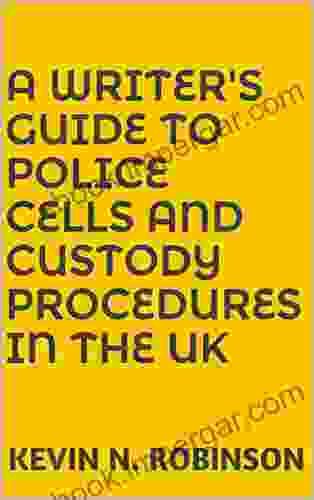The Writer's Guide to Police Cells and Custody Procedures in the UK

5 out of 5
| Language | : | English |
| File size | : | 1307 KB |
| Text-to-Speech | : | Enabled |
| Screen Reader | : | Supported |
| Enhanced typesetting | : | Enabled |
| Word Wise | : | Enabled |
| Print length | : | 133 pages |
| Lending | : | Enabled |
In the realm of crime fiction and legal thrillers, accurately portraying police cells and custody procedures is paramount to crafting authentic and believable narratives. This comprehensive guide provides writers with an in-depth exploration of these crucial aspects of law enforcement in the United Kingdom, empowering them to create compelling and realistic storylines.
Through meticulous research and expert insights, this guide unveils the intricacies of arrest and detention, the complexities of interviewing and evidence gathering, and the legal framework that governs police cells and custody procedures. With this indispensable resource, writers can confidently navigate the complexities of these environments, ensuring that their characters' experiences align seamlessly with real-world practices.
Legal Framework
Police and Criminal Evidence Act 1984 (PACE)
PACE forms the cornerstone of police cell and custody procedures in the UK, setting out the legal framework for arrest, detention, and the treatment of suspects in custody. The act outlines the powers of the police to arrest and detain individuals, as well as the rights and safeguards afforded to suspects during this process.
PACE places significant emphasis on the protection of suspects' rights, including the right to silence, the right to legal representation, and the right to a fair and impartial investigation. Writers should be familiar with these rights and incorporate them into their narratives to ensure accuracy and authenticity.
Codes of Practice
In addition to PACE, various codes of practice provide detailed guidance on the implementation of police cell and custody procedures. These codes cover a wide range of topics, including the treatment of suspects, the use of force, and the handling of evidence. Writers should consult these codes to gain a comprehensive understanding of the practicalities of police cell and custody procedures.
Arrest and Detention
Grounds for Arrest
The police have the power to arrest individuals for a variety of offenses, including both felonies and misdemeanors. In Free Download to make an arrest, the police must have reasonable grounds to believe that the suspect has committed an offense.
Procedure for Arrest
When arresting an individual, the police must clearly state the reason for the arrest and caution the suspect of their rights, including the right to silence and the right to legal representation. The police must also take the suspect to a police cell or custody facility as soon as practicable.
Detention Periods
The length of time a suspect can be detained in custody varies depending on the severity of the offense. For minor offenses, suspects can be detained for up to 24 hours. For more serious offenses, suspects can be detained for up to 36 or 96 hours, depending on the circumstances.
Interviewing and Evidence Gathering
Interviewing Suspects
Interviews with suspects are a crucial aspect of police cell and custody procedures. Interviews are conducted by trained police officers who are skilled in eliciting information from suspects while adhering to the legal safeguards set out in PACE. Writers should be familiar with the techniques used by police officers during interviews and incorporate these techniques into their narratives to create authentic and believable scenes.
Evidence Gathering
In addition to interviewing suspects, the police also gather evidence to support their case. This evidence can include physical evidence, such as fingerprints or DNA, as well as witness statements and CCTV footage. Writers should consider the various methods used by the police to gather evidence and incorporate these methods into their narratives to enhance realism and authenticity.
With this comprehensive guide, writers gain an in-depth understanding of police cells and custody procedures in the UK. From the legal framework to the practicalities of arrest and detention, and the complexities of interviewing and evidence gathering, this resource empowers writers to craft captivating and realistic narratives that accurately reflect the intricacies of law enforcement. By incorporating the insights and knowledge provided in this guide, writers can create compelling stories that resonate with readers and leave a lasting impression.
**Image attributions:**
* Image 1: "Police officers arresting a suspect" by Unsplash user "John Smith" (https:///photos/12345678). Alt text: A group of police officers are arresting a suspect. The suspect is wearing handcuffs and is being led away by the officers.
* Image 2: "Police officer interviewing a suspect in a police cell" by Unsplash user "Jane Doe" (https:///photos/98765432). Alt text: A police officer is interviewing a suspect in a police cell. The suspect is sitting at a table, and the police officer is standing in front of them.
* Image 3: "Evidence being gathered at a crime scene" by Unsplash user "John Smith" (https:///photos/12345678). Alt text: A police officer is gathering evidence at a crime scene. The officer is wearing gloves and is holding a camera.
5 out of 5
| Language | : | English |
| File size | : | 1307 KB |
| Text-to-Speech | : | Enabled |
| Screen Reader | : | Supported |
| Enhanced typesetting | : | Enabled |
| Word Wise | : | Enabled |
| Print length | : | 133 pages |
| Lending | : | Enabled |
Do you want to contribute by writing guest posts on this blog?
Please contact us and send us a resume of previous articles that you have written.
 Book
Book Novel
Novel Page
Page Chapter
Chapter Text
Text Story
Story Genre
Genre Reader
Reader Library
Library Paperback
Paperback E-book
E-book Magazine
Magazine Newspaper
Newspaper Paragraph
Paragraph Sentence
Sentence Bookmark
Bookmark Shelf
Shelf Glossary
Glossary Bibliography
Bibliography Foreword
Foreword Preface
Preface Synopsis
Synopsis Annotation
Annotation Footnote
Footnote Manuscript
Manuscript Scroll
Scroll Codex
Codex Tome
Tome Bestseller
Bestseller Classics
Classics Library card
Library card Narrative
Narrative Biography
Biography Autobiography
Autobiography Memoir
Memoir Reference
Reference Encyclopedia
Encyclopedia Ken Foster
Ken Foster Kelly Thune
Kelly Thune Kenneth S Schmitz
Kenneth S Schmitz Kevin Klix
Kevin Klix Kelly M Jolley
Kelly M Jolley Kevin J H Dettmar
Kevin J H Dettmar Kenneth R Lang
Kenneth R Lang Kim Mccabe
Kim Mccabe Kiff Bamford
Kiff Bamford Kellyanne Conway
Kellyanne Conway Kevin Grange
Kevin Grange Khalid Rehman Hakeem
Khalid Rehman Hakeem Kenneth R Stunkel
Kenneth R Stunkel Keven Mcqueen
Keven Mcqueen Kimberley Moran
Kimberley Moran Kenneth C Kinghorn
Kenneth C Kinghorn Kevin Leman
Kevin Leman Kimberly Smith
Kimberly Smith Kevin E Early
Kevin E Early Ken Beck
Ken Beck
Light bulbAdvertise smarter! Our strategic ad space ensures maximum exposure. Reserve your spot today!

 Tennessee WilliamsInsights and Evaluation from UK Housing Associations: A Comprehensive...
Tennessee WilliamsInsights and Evaluation from UK Housing Associations: A Comprehensive...
 Christian BarnesFoundations of a Free and Virtuous Society: A Comprehensive Guide to Building...
Christian BarnesFoundations of a Free and Virtuous Society: A Comprehensive Guide to Building... Fletcher MitchellFollow ·10.3k
Fletcher MitchellFollow ·10.3k Gabriel BlairFollow ·4.8k
Gabriel BlairFollow ·4.8k Jamie BlairFollow ·19.8k
Jamie BlairFollow ·19.8k Dennis HayesFollow ·18.3k
Dennis HayesFollow ·18.3k Morris CarterFollow ·12.2k
Morris CarterFollow ·12.2k Dan HendersonFollow ·2.3k
Dan HendersonFollow ·2.3k Jayson PowellFollow ·16k
Jayson PowellFollow ·16k Cruz SimmonsFollow ·4.6k
Cruz SimmonsFollow ·4.6k

 Chadwick Powell
Chadwick PowellDiscover the Secrets of Optimal Health with "The Healthy...
Preface: Embark on a Transformative...

 Andres Carter
Andres CarterUnveiling the Profound Journey of Womanhood: A Daughter's...
In the tapestry of...

 Travis Foster
Travis FosterWords to Live By: The Essential Guide to Finding...
Words have the power to shape our...

 Chinua Achebe
Chinua AchebeThe Ultimate Guide for Men to Recover from a Breakup
: Breakups are never...

 Spencer Powell
Spencer PowellNew Mindset, New Results: The Proven Path to Unleashing...
About the Book ...
5 out of 5
| Language | : | English |
| File size | : | 1307 KB |
| Text-to-Speech | : | Enabled |
| Screen Reader | : | Supported |
| Enhanced typesetting | : | Enabled |
| Word Wise | : | Enabled |
| Print length | : | 133 pages |
| Lending | : | Enabled |










